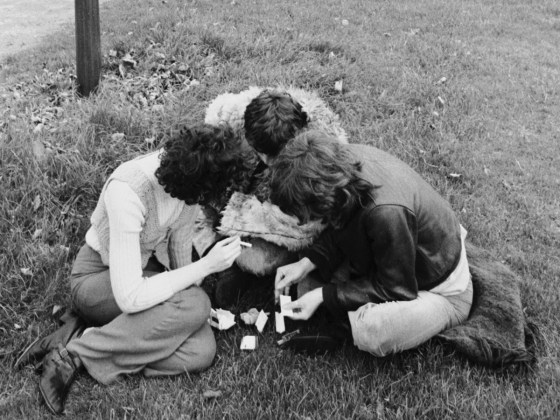LONDON -- A record number of British retirees are receiving hospital treatment after taking recreational drugs like cocaine, cannabis and amphetamines according to a new report.
Doctors diagnosed 888 people over the age of 65 as being poisoned by illicit drugs, with 473 aged 75 and over, according to new figures released by the U.K.’s Health and Social Care Information Center. Ten years ago the total was 283.
Over half of the drug admissions involve people aged 75 and over, who would have been in their twenties during the explosion of experimental drug taking in the 1960s, according to the study.
“We are getting to the period where people who grew up in the Sixties are of that age,” said David Raynes of Britain’s National Drug Prevention Alliance. “The numbers are increasing. It is going to be more of a problem."
“It’s to do with people who have dabbled with drugs most of their lives and there will be more of those as the Sixties generation hits old age,” he said. “Cannabis and cocaine are toxic and the body copes less well with these as it ages. So it’s not surprising that we are getting the problems with the drugs.”

Figures released by the U.S. based National Institute on Drug Abuse (NIDA) in 2011, showed that the percentage of Americans aged 50 to 59 who reported having used illicit or prescription drugs more than doubled, to 6.2 percent from 2.7 percent, between 2002 and 2009.
“Baby boomers' histories of illicit drug use, and their relatively tolerant attitudes toward it, along with the fact that they now comprise nearly 30 percent of the nation’s population, have raised the stakes on understanding and responding effectively to drug abuse among older adults,” NIDA Director, Nora D. Volkow, M.D. said at the time.
Raynes added that he hoped people may follow the example of aging rock stars like Paul McCartney who gave up cannabis last year at age 70, due to a “sense of responsibility” in caring for his daughter.
“I smoked my share,” the former Beatle told Rolling Stone magazine at the time. “When you’re bringing up a youngster, your sense of responsibility does kick in, if you’re lucky, at some point. Enough’s enough – you just don’t seem to think it’s necessary.”
Rolling Stones guitarist Keith Richards, who confessed to snorting some of his late father’s ashes, also quit cocaine in 2006.
But a study from Kings College London last year predicted that illicit drug taking, particularly cannabis smoking, would become more prevalent in older people in the next two decades.
“Our findings confirm what we have long suspected,” said the senior author Professor Robert Stewart. “Illicit drug use will become a more common feature in older generations over the next one or two decades.”
“Drug and alcohol treatment services need to be adequately resourced to deal with this ageing client group and the additional health problems they may be facing,” said Harry Shapiro, Director of Communications and Information at drug charity DrugScope.
